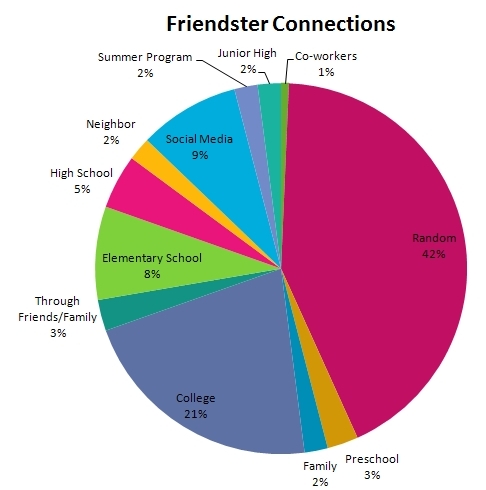I stumbled upon an interesting thread by Michael Arrington of TechCrunch. It seems that there’s a controversy in the blogosphere about what sites are featured by TechCrunch, with many people attacking Arrington when he doesn’t review their sites. The claim is that Arrington refuses to showcase many web2.0 websites because he is in bed with some of the developers of the competition, or as Arrington puts it, it’s a “friendship conflict” because of a personal agenda or a favor to his friends. Arrington addresses this issue better than anyone else can.
Let’s begin by introducing TechCrunch. If you go to their page, they have 132K subscribed users. That’s a regular readership of 132,000+ people. In the blogosphere, that’s a hell of a lot of people. It’s so popular that within several hours of announcing TechCrunch 8 in New York City, the 450 spots were taken, and I missed the deadline by a few hours. (I was fortunate to have made the wait list.)
TechCrunch is a blog that often explores startups. Its reviews are biased yet interesting. TechCrunch is updated multiple times daily and its content is damn good. I suppose that’s why people keep coming back, despite what may be duplicitious ethics (or so the opponents say).
I’ll be the first to admit that I haven’t been reading TechCrunch often to see Arrington make a claim that he’s issuing statements about being bashed “every couple of months,” and I didn’t know what to expect until I began reading the wave of responses on Digg.
After I dugg the story, I read the comments on Digg. The headline is not biased. The summary, however, already had a motive — and I’m disappointed.
I am not an apologist of TechCrunch. However, I see 10+ exhaustive posts from TechCrunch a day, which means that they’re doing a pretty good job at keeping themselves occupied with reviewing and expressing their opinions on startups. Whether the posts conflict with another investment by Arrington or not, they offer valuable insight — and to many, these posts expose the site to the thousands of readers who read TechCrunch regularly. That in itself is something big for a startup to consider, even if the review is not necessarily that positive.
The first comment (with 15 Diggs) is from someone who mentions he hates TechCrunch. Fifteen people have voted in support of this comment saying “Oh how I hate TechCrunch” as of this writing. The people supporting Arrington were Dugg down, just like this one (which I happen to agree with):
He’s a single guy, probably getting bombarded by 50 companies like yours a day. If you’re relying on him that much to get the word out about your product, you might want to take a look at your product and ask yourself these questions:
1) Is he not responding/reviewing because maybe your site sucks? (Do you expect him to review every little web2.0 startup?)
2) If it was good enough, would it really need him to make a push? (Submit it to digg for christ’s sake. Let the masses decide.)
3) What would you do in his shoes if you were being bombarded by press kits and requests for reviews (knowing he sits on boards of a company or two, aka has other jobs)?Use your head and stop bitching. If your product is good enough, it’ll do just fine without him.
This post had -1 Diggs when I read it. I dugg it back up to 0 diggs.
I often stumble upon articles that really have a definite radical comment following. Anything that’s Dugg up pretty high often does well with the critics — and anyone stating their opinions to the contrary are Dugg down.
This is what I dislike about Digg: its bias. In issues of technology politics, there’s a louder voice, and anyone opposing this voice will be shot down — or dugg down in this particular case. Buried comments cause people to take extra effort to read them — and are often coupled with the stupid comments like “who cares,” or “this is lame.” Good comments (of good content) are mixed in with these nonsensical comments. It is a mediocre system. I’m not sure I like the popularity of the comment system at all that much.
I was ready to write my own response but decided against it and addressed my concern here. I knew what the end result would be — a buried post simply because I had an opinion that was not mainstream. Sure, we should Digg those websites, but there’s an inherent flaw in the comment system when people begin digging a suitable comment to the ground.
I’m not sure people are getting it — blogging is not journalism. The ethics for both writing mediums are not the same. I’d be a lot more conservative in my writing style if I was writing for mainstream media. Welcome to the blogosphere, people! It’s not!





Those are some good observations. Personally, I think part of the problem is that the more popular digg gets, the more people and therefore more of the “crowd” anonimity mentality that plagues big cities. People ironically act less mannered when there is less chance of a personal connection.
A lot of the lesser sites (especially Reddit) are being favored instead. The maturity level is higher there, and maybe this does have to do with the smaller number of users. I think it’s also a different type that flocks to Reddit versus Digg, with the former being more well-rounded than Digg itself.
Digg is the adolescent playground of braindead zombies, sarcastically spouting their so-called “knowledge” derived from slacking off, playing videos games all day, text messaging, and what they’ve absorbed (without any effort whatsoever) from our dumbed-down culture and propaganda television. They bury stories with signifigance and digg up stories of unworthy signifigance in their cess pool of mass ignorance. It is ironic, but a glaring example of societal degereration. This group-think, collectivist mentality makes me sick.
Digg is a sad example of how society has degraded into moronic despotism with the highest level of arrogance. A sign of the times as culture implodes from a lack of anything meaningful or truthful.